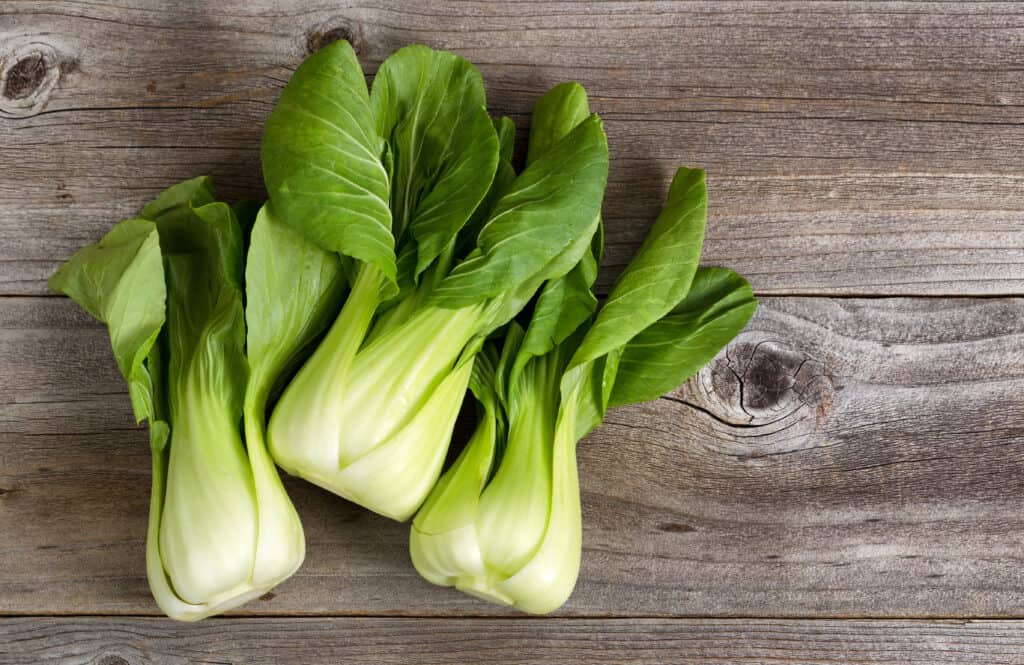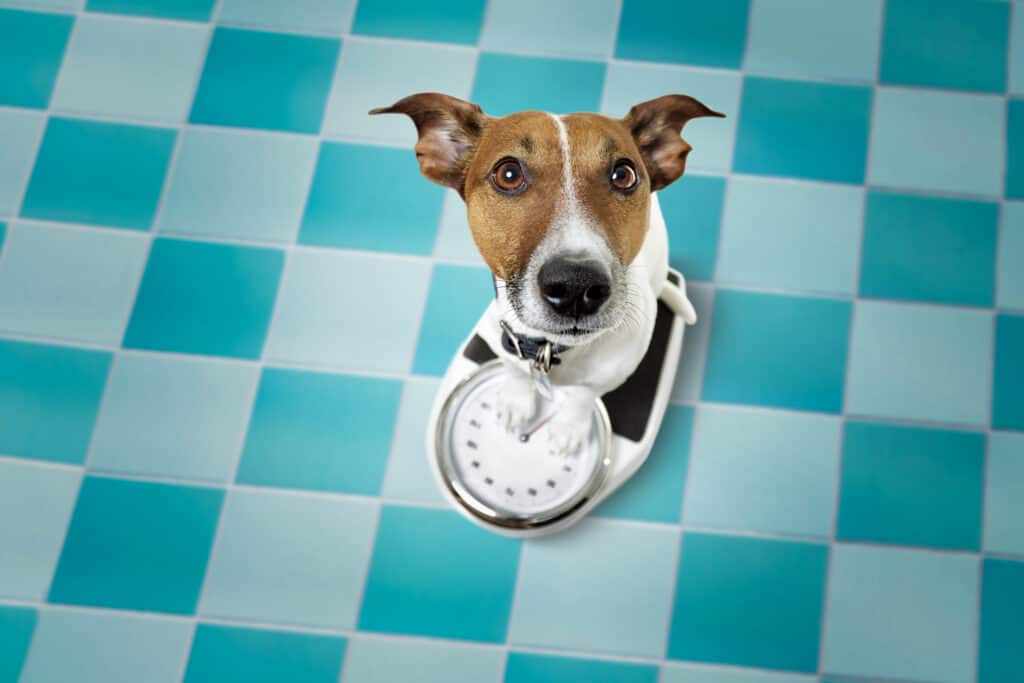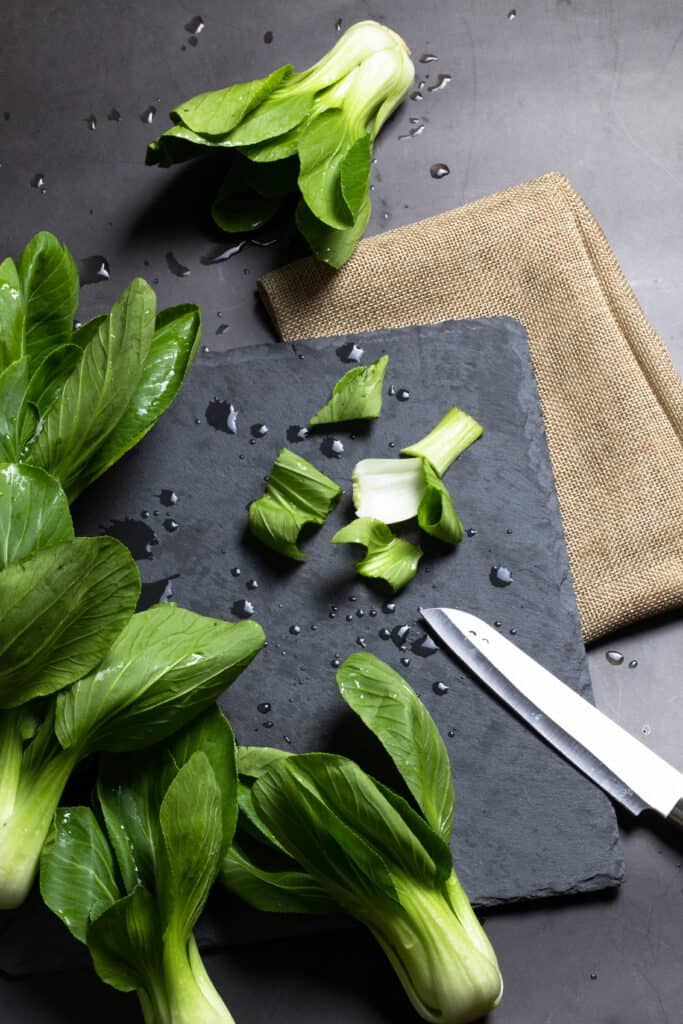Humans domesticated dogs over 11,000 years ago and they’ve evolved alongside us from their carnivorous wolf ancestors into omnivorous domestic dogs. This means they can eat lots of different food, not just meat. Green leafy veggies like bok choy are great for us, but can dogs eat bok choy too?
Let’s take a closer look and discover if bok choy is toxic or healthy for dogs.
Is Bok Choy Safe for Dogs?
Yes, bok choy is safe for dogs to eat.
It’s a low calorie, green leafy veg that’s filled with nutrition and while it shouldn’t replace your dog’s good quality balanced dog food, it’s a great way to add diversity and nutrients into their diet.
Just a word of caution here before you put bok choy on your grocery list. It’s very fibrous and this can sometimes upset a dog’s tummy, or cause flatulence, so don’t give them leaf after leaf and if your dog is sensitive to high-fiber foods, maybe give it a miss.
What is Bok Choy?
It’s a leafy non-heading cabbage in the Brassica family with four-petalled cruciferous flowers. Cruciferous is the old word for a cross, and this describes its bright yellow four-petaled blooms. Incidentally these flowers are also OK for dogs to eat, but it usually means the leaves are past their best and a little on the bitter side.
In the USA bok choy is its standard name, but in Europe it’s sometimes referred to as pak choy. Both names mean “white vegetable” in Cantonese, one of its native central Asian growing areas.
Pak choy has dark green loose leaves that don’t form a tight head and rounded white bases comprised of thick juicy stalks. It’s related to turnips and broccoli and it’s one of the oldest known cultivated vegetables in the world dating back thousands of years.
There are several varieties including regular bok choy with its white base and dark green leaves, and Shanghai bok choy that’s light green all over. Both are just fine for a dog to eat in moderation.
Bok choy tastes like a mixture of water chestnut and spinach. It’s quite sweet for a leafy green veggie, but as it matures, deeper peppery tones emerge. Both are delicious, but many dog owners say their pup prefers the immature fresh new leaves with the sweeter flavor.

Bok choy a leafy non-heading cabbage in the Brassica family safe for dogs to eat.
©tab62/Shutterstock.com
Health Benefits of Bok Choy
Despite having 95% water content bok choy is packed with healthy benefits that support eyesight, heart health, the immune system, and digestion.
Here are some of the nutrients in bok choy:
- Vitamin A: is essential for good eyesight and a healthy heart
- Vitamin K: helps promote blood clotting and calcium absorption
- Vitamin B6: converts food into energy and helps transport red blood cells around the body
- Vitamin C: helps strengthen the immune system, repair tissues and help absorb iron
- Antioxidants: mop up the free radicals that cause damage to cells and help prevent diseases like cancer
- Folate: helps metabolize protein, forms DNA, and supports iron absorption
- Magnesium: boosts muscles and nerve function
- Phosphate: essential for bones growth, energy, nerve and muscle maintenance
- Fiber: promotes healthy bowels and regular stools.
Bok choy is also very low in calories, so this makes it a good treat for obese dogs. According to the Association for Pet Obesity Prevention 56% of pet dogs are overweight or obese in the States. Excess weight is a real problem for dogs because it reduces their quality of life, creates joint problems, diseases like diabetes, and distressing painful pancreatitis. Pancreatitis is when the pancreas gets inflamed on a high-fat diet and begins to digest itself.
If your dog has a pancreatitis attack it’s much more likely to occur again, and they will need a specific low-fat diet for the rest of their lives. So, it’s good news that pak choy is safe for dogs to eat and very low fat too.

Bok choy is also very low in calories, so this makes it a good treat for obese dogs.
©iStock.com/damedeeso
Risks of Bok Choy
There are very few risks associated with dogs eating pak choy. On the whole, it’s a safe vegetable with proven benefits but here are the potential risks:
Gastric Upset
Dogs can eat pak choy safely, but it’s a very fibrous food so in large amounts it may cause diarrhea. Some dogs tolerate high fiber better, but it’s best to feed it in small amounts.
If your dog does develop diarrhea, give them small meals of plain food like sweet potatoes and white fish or rice and chicken to firm up their stool and keep the hungry feeling at bay. If they still have diarrhea after a few days, call a vet for advice because long-term gastric upsets can cause dehydration.
Choking
Bok choy has long fibrous leaves which some dogs may choke on and raw bok choy can turn into a ball of fiber if it’s chewed on for a long time, so it’s important to cut it into small pieces and never give dogs a whole leaf. Small dogs are particularly at risk of choking on fibrous leaves along with dogs that eat quickly.
How Much Bok Choy Can a Dog Have?
Dogs can eat bok choy so long as it doesn’t upset their stomach, but the ASPCA recommends extra foods make up no more than 10% of their daily meal. The rest should be good quality dog food.
How to Give Dogs Boy Choy
Bok choy is a healthy snack for dogs whether it’s raw or cooked, but it’s really important you don’t add any seasoning or flavors to it. It’s because some seasonings are actually toxic for dogs including onion, garlic, and xylitol
To safely prepare bok choy, wash it thoroughly to remove any chemical residue. If you cut it into pieces your dog can eat it raw with no extra preparation.
Here are some ways to safely cook bok choy for dogs:
Steaming
A minute or two over steam is all that’s needed to soften the leaves and retain lots of nutrients. The more it’s cooked the fewer nutrients it contains.
Boiling
Put bok choy in a saucepan of boiling water for a few minutes to soften the stems.
Don’t cook bok choy in oil because oil is very fatty and contributes to weight gain. It can also lead to pancreatitis. The best way to prepare bok choy is raw but washed, or steamed/simmered for a few minutes until soft.
That’s it!

To safely prepare bok choy, wash it thoroughly to remove chemical residue and cut into small pieces to avoid choking.
©Anchalee Wiangkao/Shutterstock.com
What Food is Toxic for Dogs?
Dogs can eat bok choy and it’s good for them, but there are other food and drinks that are toxic.
Here are some of the foods your dog should avoid:
Grapes
Grapes are sweet and delicious, but dogs can’t process the compounds and they cause organ failure. This includes all forms of grapes including juices, wines, and raisins
Onions and Garlic
All Allium plants are highly toxic to dogs and cause anemia because their compounds stick to dogs’ red blood cells. This includes shallots, leeks, and Allium flower bulbs.
Macadamia Nuts
These tasty nuts contain indigestible compounds that cause organ failure in a few hours. Macadamia nuts are used in cakes and biscuits, so keep a close eye on your sweet treats
Black Walnuts
Black walnuts contain organ-damaging compounds, and they grow a kind of mold that’s highly toxic to dogs.
Alcohol
Any form of alcohol can lead to alcohol poisoning in dogs including wine, beer, cocktails, spirits, and alcohol-infused sweets.
Chocolate
Chocolate is full of stimulants that a dog can’t process. Instead, the theobromine and caffeine contribute to organ failure.
Xylitol
This common household artificial sweetener can be fatal in an hour because it causes hypoglycemia in dogs. Xylitol is often found in cakes, biscuits, and even Jell-O particularly the low sugar varieties.
Is Bok Choy Toxic to Dogs?
Boy choy is not toxic to dogs, in fact, it’s quite the opposite!
It’s a healthy, low-fat treat packed with essential nutrients that keep a dog fit and healthy. Whilst it shouldn’t make up more than 10% of a dog’s daily meal it’s an excellent veggie you can give on a regular basis provided it doesn’t upset their tum or pose a choking hazard.
So yes! Dogs can eat bok choy with very little risk. Bring on the greens.
Up Next
- 7 Reasons Zucchini Is Safe for Dogs To Eat
- Can Dogs Drink Beer, What About Other Alcohol?
- Is Pizza Safe or Dangerous for Dogs to Eat?
The photo featured at the top of this post is © Chendongshan/Shutterstock.com
Ready to discover the top 10 cutest dog breeds in the entire world?
How about the fastest dogs, the largest dogs and those that are -- quite frankly -- just the kindest dogs on the planet? Each day, AZ Animals sends out lists just like this to our thousands of email subscribers. And the best part? It's FREE. Join today by entering your email below.
Sources
- ASPCA, Available here: https://www.aspca.org/pet-care/dog-care/dog-nutrition-tips
- Taylor & Francis Online, Available here: https://www.tandfonline.com/doi/abs/10.1080/01635581.2001.9680607
- Fresh City, Available here: https://www.freshcityfarms.com/blogs/9-facts-you-might-not-know-about-bok-choy
Thank you for reading! Have some feedback for us? Contact the AZ Animals editorial team.






